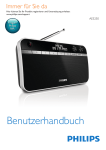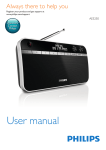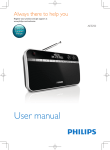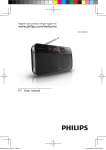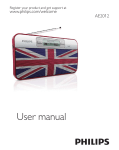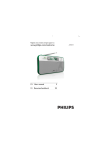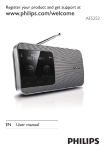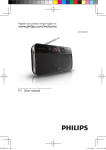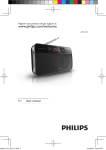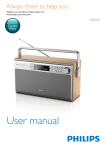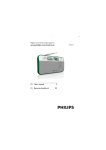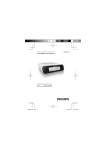Download Philips Portable Radio AE5250
Transcript
Register your product and get support at
www.philips.com/welcome
User manual
AE5250
1 Important
Safety
2 Your FM/DAB radio
Introduction
What’s in the box
Overview of the main unit
3 Get started
Place the radio
Prepare FM/DAB antenna
Connect power
Turn on
Adjust the volume level
4 Listen to FM radio
Tune to FM radio
Store FM stations manually
Select a preset FM radio station
Use FM menu
5 Listen to DAB radio
Tune to DAB radio
Change DAB station
Scan DAB radio stations
Display station information
Store DAB stations manually
Select a preset DAB radio station
Use DAB menu
6 Product information
Tuner (FM)
Tuner (DAB)
General information
Engl i s h
Contents
3
3
4
4
4
5
6
6
6
6
7
7
8
8
8
8
8
10
10
10
10
10
11
11
11
13
13
13
13
7 Notice
14
8 Troubleshooting
15
9 About DAB
16
TR
2
1 Important
Safety
Hearing safety
Listen at a moderate volume.
Using headphones at a high volume can
impair your hearing. This product can
produce sounds in decibel ranges that may
cause hearing loss for a normal person,
even for exposure less than a minute. The
higher decibel ranges are offered for those
that may have already experienced some
hearing loss.
Sound can be deceiving. Over time your
hearing ‘comfort level’ adapts to higher
volumes of sound. So after prolonged
listening, what sounds ‘normal’ can actually
be loud and harmful to your hearing. To
guard against this, set your volume to a safe
level before your hearing adapts and leave
it there.
To establish a safe volume level:
Set your volume control at a low setting.
Slowly increase the sound until you can
hear it comfortably and clearly, without
distortion.
Listen for reasonable periods of time:
Prolonged exposure to sound, even at
normally ‘safe’ levels, can also cause hearing
loss.
Be sure to use your equipment reasonably
and take appropriate breaks.
3
TR
Be sure to observe the following guidelines
when using your headphones.
Listen at reasonable volumes for reasonable
periods of time.
Be careful not to adjust the volume as your
hearing adapts.
Do not turn up the volume so high that
you can’t hear what’s around you.
You should use caution or temporarily
discontinue use in potentially hazardous
situations. Do not use headphones while
operating a motorized vehicle, cycling,
hazard and is illegal in many areas.
Where the mains plug or an appliance coupler
is used as the disconnect device, the disconnect
device shall remain readily operable.
Warning
Never remove the casing of this unit.
Never lubricate any part of this unit.
Never place this unit on other electrical equipment.
Only use this unit indoors. Keep this unit away from
!
"#
or heat.
Note
The type plate is located on the back of the unit.
Engl i s h
2 Your FM/DAB
radio
Congratulations on your purchase, and welcome
#$%
##
Philips offers, register your product at www.
philips.com/welcome.
Introduction
With this unit, you can enjoy both FM radio and
Digital Audio Broadcasting (DAB) radio.
Digital Audio Broadcasting (DAB), is a way of
broadcasting radio digitally through a network of
transmitters. It provides you with more choice,
better sound quality and more information.
What’s in the box
Check and identify the contents of your
package:
Main unit
AC adaptor
User manual
TR
4
Overview of the main unit
d
e
f
a
b
g
h
c
k
i
l
j
m
a Display panel
Display current status.
b
Turn on or off the unit.
c 1 - 5+
Numeric keypads: Set/select a preset
radio station.
d
e
/
h SELECT
Display DAB station information.
&
'*+
&
i
TUNING
Tune to a FM station.
Navigate DAB station list.
Navigate FM/DAB menu.
j DC IN
Jack for the AC adaptor(supplied).
/ VOL
Adjust volume.
k FM/DAB antenna
Improve FM/DAB reception.
f DAB/FM
Select DAB or FM radio.
5
g MENU
Select DAB menu option.
Scan DAB radio stations.
TR
Jack for the headphone.
l Battery compartment door
m Retractable stand
Provide stand support.
Battery Life (Approx. hours)
When using
VKV (FM)
DAB
alkaline R6 (size AA)
8
8
Engl i s h
3 Get started
Výstraha
Use of controls or adjustments or performance of
procedures other than herein may result in hazardous
radiation exposure or other unsafe operation.
Always follow the instructions in this chapter in
sequence.
If you contact Philips, you will be asked for the
model and serial number of this apparatus. The
model number and serial number are on the
back of the apparatus. Write the numbers here:
Model No. _____________________________
Serial No. _______________________________
Option 1: AC power
Caution
Risk of product damage! Ensure that the power supply
voltage corresponds to the voltage printed on the back
or the underside of the product.
Risk of electric shock! When you unplug the AC adaptor,
always pull the plug from the socket. Never pull the
cord.
;
*&#
#
or sold with this unit.
Note
Place the radio
%
#
#
out the retractable stand from bottom of the
unit at back-side.
The type plate is located on the back of the apparatus.
1
Connect one end of the AC adaptor to the
DC IN socket on the main unit.
2
Connect the other end of the AC adaptor
to the wall outlet.
Prepare FM/DAB antenna
For optimal reception, fully extend and adjust
the position of the FM/DAB antenna.
Tip
Position the antenna as far away as possible from
your TV, VCR or other radiation source to prevent
interference.
Connect power
You can use this radio on AC power or battery
power.
TR
6
Option 2: Battery power
Caution
Batteries (battery pack or batteries installed) shall not
<#
<= the like.
Danger of explosion if battery is incorrectly replaced.
Replace only with the same equivalent type.
Do not mix batteries (old and new or carbon and
alkaline, etc.).
Remove batteries if they are exhausted or if the unit is
not to be used for a long time.
2
Open the battery compartment at the
back of the unit.
Insert 6 R6/UM-3/AA size batteries (not
supplied) with correct polarity
(+/-) as indicated, then close the battery
compartment.
3
The unit is ready to operate.
1
Tip
„Batter y low“ message is shown when the batter y
power is low. Change batteries to ensure normal
operation.
Note
Batteries contain chemical substances, so they should
be disposed of properly.
7
TR
Turn on
Press .
» The unit switches to the last selected
source.
To turn off the unit:
» Press again.
Adjust the volume level
During play, press / VOL to increase/
decrease the volume level.
Tune to FM radio
1
2
Press DAB/FM repeatedly to select FM
radio.
Press / TUNING to tune to a radio
station.
Note
To overwrite a preset station, store another station in
its place.
Select a preset FM radio
station
1
2
Search FM radio stations
1 Tune to FM radio.
2
3
Press and hold / TUNING for more
than two seconds to start searching
stations.
» The FM tuner tunes to a station with
strong reception automatically.
?##@
the desired station.
Note
If you want to select a preset number 6-10, press and
hold 5+ and then press corresponding number key.(For
example, if you want to select 6, press and hold 5+ and
then press 1.)
Use FM menu
Store FM stations manually
1
You can program a maximum of 10 preset FM
radio stations.
1 Tune to your desired FM station.
2
2
To preset number 1 - 5, press and hold the
numeric keypad 1 - 5 for two seconds;
To select the preset number 6 - 10,
press and hold the numeric keypads 5+
simultaneously with other keypad (e.g. 5+
with 1 for 6; 5+ with 5 for 10) for two
seconds.
» The preset number of the saved station
appears.
Press DAB/FM repeatedly to select FM
radio.
Press numeric keypads to select a preset
number.
3
4
In FM mode, press MENU to enter the FM
menu.
Press / TUNING to scroll the menu
options:
[Audio setting]
[System]
To select an option, press SELECT.
Repeat step 2-3 if sub-option is available
under one option.
[Audio setting]
This function enables you to select mono or
stereo
[Forced mono] Select mono broadcast.
[Stereo allowed] Select stereo broadcast.
TR
8
Engl i s h
4 Listen to FM
radio
[System]
[Factory reset] Resets all the settings of
this radio to factory default.
[SW version] Software version of the
radio is shown.
[Software upgrade] Upgrade software.
Software update for your radio may be available
in future.
Visit Philips website constantly to check if the
updating information is provided.
Note
If no button is pressed within 15 seconds, the menu
exits.
9
TR
Change DAB station
1
2
3
Engl i s h
5 Listen to DAB
radio
Tune to a DAB station.
Use / TUNING to navigate through
available stations.
Press SELECT to choose a station.
Tune to DAB radio
X
'*+
time, the radio automatically scans DAB radio
stations. Then station list is retained in memory
so the next time the radio is switched on, the
station scan does not take place.
1 Press DAB/FM repeatedly to select DAB
radio.
» A bar graph indicates the progress of
the search and the number of stations
found increase as the scan progresses.
Scan DAB radio stations
When playing a DAB station, or the current
station is not available, press and hold MENU
for more than two seconds.
» The radio scans all available DAB radio
stations and broadcasts the current station.
Tip
New stations and services will be added in the DAB
broadcast. To make new DAB stations and ser vices
available on your radio, do scan on a regular base.
Progress bar
Number of
Stations found
A When scan is completed, the stations are
listed in numerical then alphabetic order.
» First available station is broadcast.
B If there is no DAB coverage currently
available
» [No DAB Station] is displayed.
a Change the location or adjust antenna.
b Press SELECT to scan again.
Display station information
1
2
Tune to a DAB radio station.
Press SELECT repeatedly to scroll through
the following information (if available):
» Dynamic label segment (DLS)
» Signal strength
» Program type (PTY)
» Ensemble Name
» Channel and frequency
» Signal error rate
» Bit rate and audio status
» Time
» Date
TR
10
Store DAB stations manually
2
You can store a maximum of 10 preset DAB
radio stations.
1 Tune to your desired DAB station.
2
To preset number 1 - 5, press and hold the
numeric keypad 1 - 5 for two seconds;
To select the preset number 6 - 10,
press and hold the numeric keypads 5+
simultaneously with other keypad (e.g. 5+
with 1 for 6; 5+ with 5 for 10) for two
seconds.
» The preset number of the saved station
appears.
3
4
Press / TUNING to scroll the menu
options:
[Station list]
[Full scan]
[Manual tune]
[DRC] (dynamic range control)
[System]
To select an option, press SELECT.
Repeat step 2-3 if sub-option is available
under one option.
[Full scan]
Full scan is used to perform a wide range of
DAB radio search (outside UK).
Note
Note
If no button is pressed within 15 seconds, the menu
exits.
To overwrite a preset station, store another station in
its place.
Select a preset DAB radio
station
1
2
Press DAB/FM repeatedly to select DAB
radio.
Press numeric keypads to select a preset
number.
Note
If you want to select a preset number 6-10, press and
hold 5+ and then press corresponding number key.(For
example, if you want to select 6, press and hold 5+ and
then press 1.)
[Manual tune]
Z#
#
channel/frequency and add this to the station
list.
This function can be used to obtain the
##
#[
frequency, taking into account the position of
the aerial.
» *#
of the display. The position of this rectangle
indicates the signal strength (the further
towards the right, the greater the signal
strength).
» The second line of the display shows the
%
line of the display shows a rectangle.
Tip
Adjust the position of the antenna to obtain the
optimum signal strength.
Use DAB menu
1
In DAB mode, press MENU to enter the
DAB menu.
11
TR
Engl i s h
[DRC]
Dynamic range control (DRC) adds or removes
a degree of compensation for the differences in
the dynamic range between radio stations.
[DRC ] (DRC is switched on.)
[DRC off] (DRC is switched off.)
[System]
[Info] (Software version of the radio is
shown.)
[Factory reset] (Resets all the settings of
this radio to factory default.)
» \]^`^&%{
[Software upgrade] Upgrade software.
Software update for your radio may be available
in future.
Visit Philips website constantly to check if the
updating information is provided.
TR
12
6 Product
information
Note
Product information is subject to change without prior
notice.
Tuner (FM)
Tuning Range
87,5 – 108 MHz
Tuning grid
50 kHz
Tuner (DAB)
Tuning Range
174.928MHz - 239.200MHz
(Band III)
General information
AC/DC adaptor
- Brand name
- Model
- Input
- Output
PHILIPS
OH-1048A0750500U2VDE
OH-1048A0750500U2-UK
100-240V~ 50/60Hz
250mA
7.5V 500mA
Operation
Power
Consumption
5W
Standby Power
Consumption
<1W
Power output
0.3W (10% THD)
Batter y power
input
AA x 6
13
TR
Headphone
output power
Dimensions
- Main Unit (W
x H x D)
Weight
- Main Unit
12mW x 2 (32 ohm)
317 x 133 x 90 mm
0.884kg
*
device that are not expressly approved by
Philips Consumer Lifestyle may void the user’s
authority to operate the equipment.
Your product contains batteries covered by the
European Directive 2006/66/EC, which cannot
be disposed with normal household waste.
Please inform yourself about the local rules on
separate collection of batteries because correct
disposal helps to prevent negative consequences
for the environmental and human health.
This product complies with the radio
interference requirements of the European
Community.
Environmental information
All unnecessary packaging has been omitted.
We have tried to make the packaging easy to
separate into three materials: cardboard (box),
polystyrene foam (buffer) and polyethylene
(bags, protective foam sheet.)
Your system consists of materials which can
be recycled and reused if disassembled by
a specialized company. Please observe the
local regulations regarding the disposal of
packaging materials, exhausted batteries and old
equipment..
This product complies with the requirements
of the following directives and guidelines:
2004/108/EC + 2006/95/EC
Your product is designed and manufactured
with high quality materials and components,
which can be recycled and reused.
When this crossed-out wheeled bin symbol is
attached to a product it means that the product is
covered by the European Directive 2002/96/EC.
Please inform yourself about the local separate
collection system for electrical and electronic
products.
Please act according to your local rules and
do not dispose of your old products with your
normal household waste. Correct disposal of
your old product helps to prevent potential
negative consequences for the environment and
human health.
TR
14
Engl i s h
7 Notice
8 Troubleshooting
Warning
Never remove the casing of this apparatus.
To keep the warranty valid, never try to repair
the system yourself.
If you encounter problems when using this
apparatus, check the following points before
requesting service. If the problem remains
unsolved, go to the Philips web site www.philips.
com/welcome. When you contact Philips, ensure
that the apparatus is nearby and the model
number and serial number are available.
No power
Ensure that the AC power plug of the unit
is connected properly.
Ensure that there is power at the AC
outlet.
Insert the batteries with their polarities (+/–
signs) aligned as indicated.
Replace the battery.
No sound
Adjust the volume.
Poor radio reception
Increase the distance between the unit and
your TV or VCR.
Fully extend the antenna.
15
TR
Engl i s h
9 About DAB
About Digital Audio Broadcasting (DAB)
DAB digital radio is a new way of broadcasting
radio via a network of terrestrial transmitters.
It provides listeners with more choice and
information delivered in crystal clear, cracklefree sound quality.
– The technology allows the receiver to lock on
– With DAB digital stations there are no
frequencies to remember, and sets are tuned
by station name, so there’s no returning on the
move.
What is a multiplex?
Digital radio operation is made up of a single
block of frequencies called a multiplex. Each
multiplex works within a frequency spectrum,
such as Band III for DAB broadcasts.
DAB BROADCASTERS AND DLS
Each DAB broadcaster (or multiplex operator)
also provides text and audio data services.
Some programmes are supported by Dynamic
Label Segments (DLS).This is data which you
can read as scrolling text on your DAB radio
display. Some stations transmit the latest news,
travel, and weather, what’s on now and next,
website addresses and phone numbers.
For more information on digital radio coverage
and services, please visit: www.drdb.org.
TR
16
Specifications are subject to change without notice
© 2011 Koninklijke Philips Electronics N.V.
All rights reserved.
AE5250_12_CCR_V1.0

















